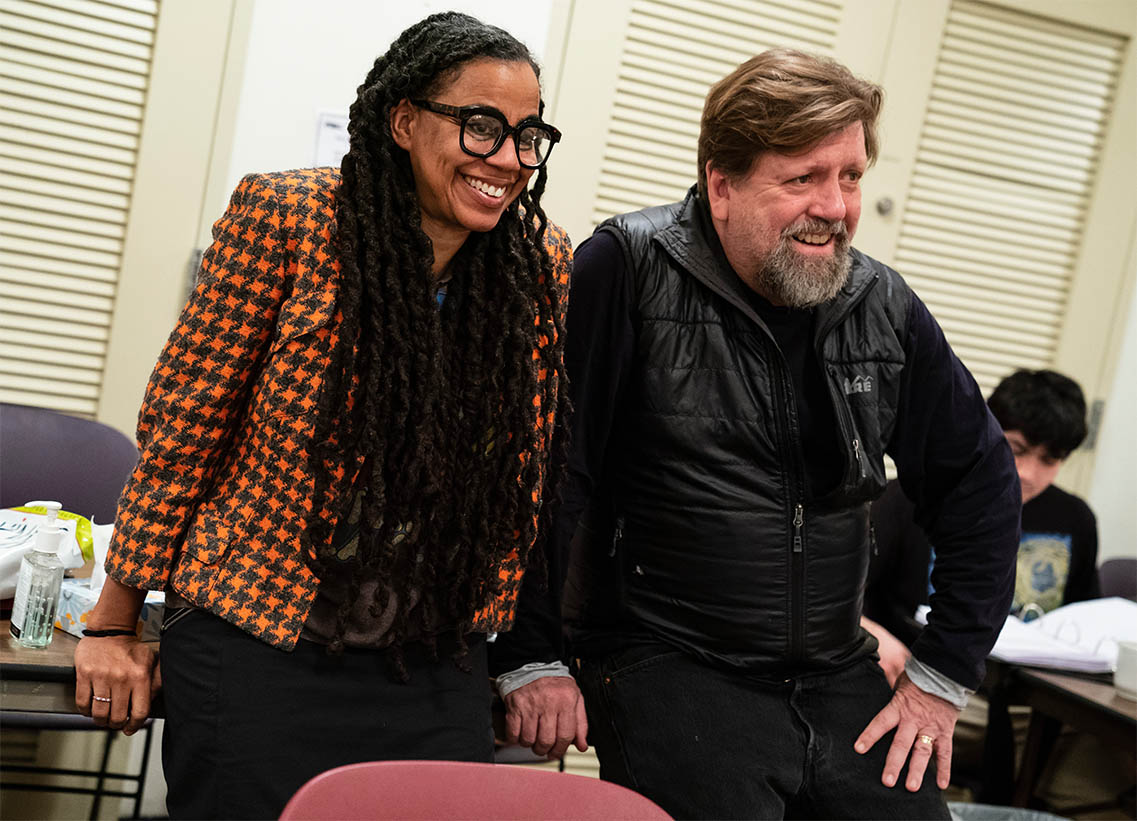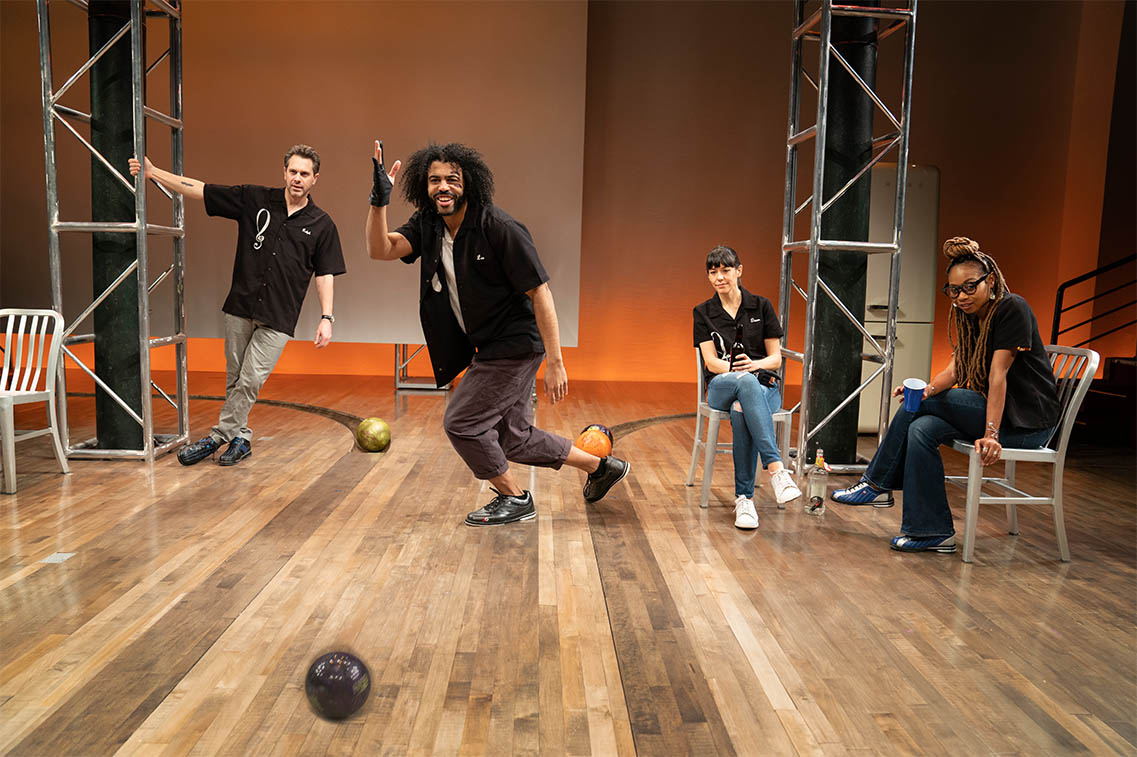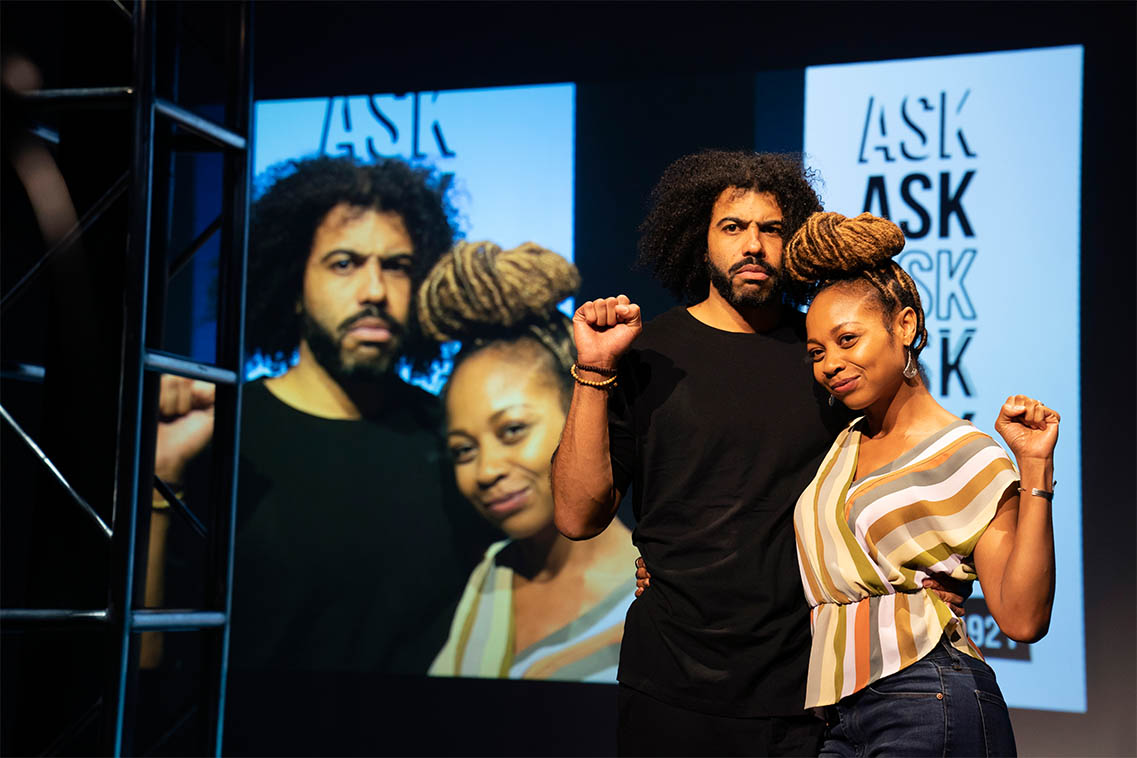In his famous critique of Richard Wright’s Native Son, James Baldwin noted that in the sensational and hugely popular 1940 novel, readers confront “a monster created by the American republic” and are meant “to feel both pity and horror at his awful and inevitable doom.” Baldwin was talking, of course, about Bigger Thomas, the novel’s young black protagonist, who hurtles incontrovertibly toward violence and death. Wright falters, Baldwin argues, by attempting “to redeem a symbolical monster in social terms.” Rather than rendering Bigger as a person with an inner life and discernible relationship to a community, Wright made him merely a category of person, an instrument for scoring a political point.
Suzan-Lori Parks took that critique deeply to heart in her screenplay for the film based on Wright’s novel, directed by the visual and conceptual artist Rashid Johnson, and recently released on HBO. At the same time, her shattering new play, White Noise, hews to Baldwin’s implied principles, too, as it turns the tables on Wright’s premise. Exploring, primarily, the relationship between a black man and his white friend, White Noise reveals a different, more terrifying and persistent monster created by the American republic: the white supremacist. In both cases, Parks opens a space for us to question the inevitability of their fates, to consider what would have to change to correct their courses toward doom.
In their version of Native Son (the third and, so far, best film adaptation), Parks and Johnson maintain the Chicago setting, but update it to the present day. Among other changes, they’ve given their Bigger—“Big” to his friends—a perceptible interior life: Sporting bright green hair, black nail polish, Malcolm-style eyeglasses, and a leather jacket with the phrase “Or am I freaking out” scrawled across it, he listens to Bad Brains, the Dead Kennedys, and Beethoven. The books strewn around his room in the small apartment where he lives with his mom, a paralegal, and his siblings include Legs McNeil’s Please Kill Me: The Uncensored Oral History of Punk, Claudia Rankine’s Citizen, and—especially significant in relation to Parks’s White Noise—Paul Beatty’s tragic, side-splitting satire The Sellout.
In short, this searching young man, played by Ashton Sanders in a heartrending performance, won’t be pigeonholed. He broods through his world, not quite identifying with a friend trying to crawl up an unpromising job ladder, nor with another who is planning to rob a corner store. We see him struggle both to fit in and to break away.
Baldwin wrote that no African American “exists who does not have his private Bigger Thomas living in the skull.” None can escape the sense that this “dangerous and unloved stranger is part of himself forever.” Possessing more critical self-consciousness than Wright’s Bigger, Parks’s Big knows that about himself, too.
The private Bigger Thomas in the skull of Leo, the protagonist of White Noise (a riveting Daveed Diggs in a recent production at the Public Theater), seems to have been quiescent as Leo went to college, formed long-lasting friendships with the play’s three other characters, and pursued a career as an artist. He and his friends are educated, creative millennials, properly, if superficially, chill about race, gender, sexuality, class—until, just before the action of the play begins, Leo is smashed into the pavement by cops for strolling while black.
Popular
"swipe left below to view more authors"Swipe →
Leo’s girlfriend, Dawn (Zoë Winters), a white defense attorney, urges him to sue, but Leo has a different, “kind of scary,” and “totally far-out idea that could solve everything.” And he sounds like he might have been thinking about Bigger Thomas when he tells her and their friends, the (also interracial) couple Ralph (Thomas Sadoski) and Misha (Sheria Irving) why: “Black folks out there every day are falling prey to the anger, the unarticulated self-loathing, the unfathomable despair—so under the pressure, they end up doing a crime and getting locked up and then, what, then they’re slaves to the system. Boom. The shit’s getting to me and I gotta take it somewhere.”
His idea—the one that might fix everything—is that he will temporarily sell himself to Ralph, his white best friend, for $89,000, the sum of his credit-card and student-loan debt. For 40 days, Leo will be Ralph’s slave. A similar conceit also features in The Sellout, the 2015 novel by Paul Beatty in which a beleaguered black man enslaves himself to a friend. But in Beatty’s caustic satire, that man is a washed-up supernumerary from The Little Rascals, “a Living National Embarrassment,” Beatty writes, while Parks’s Leo is a hip, righteous, upwardly mobile sort of guy—beyond woke, as we learn from his opening monologue, because he suffers from insomnia. (The play’s title refers to a white-noise machine Ralph once gave him to help him sleep.) Would a man like Leo really volunteer to be a white man’s slave?
The play works best if you follow the formal clues suggesting you consider that an irrelevant question. Parks’s plays, even the ones in an ostensibly realistic mode, always push productively against the edges of plausibility. Her work doesn’t take its cue from what is likely to happen, but rather invites audiences into an imaginary situation: to consider what if something were to happen, and to trace the not-quite-tenable to the terrible truths its logic reveals.
Even when she offers up contemporary characters in recognizable settings, speaking in everyday prose while enacting a (mostly) linear plot, which is not what she always does, Parks prods some daring leaps of the imagination. That was the case with her Pulitzer Prize–winning two-hander, Topdog/Underdog (2001), for instance—her work with which White Noise has the most in common—which pits two brothers, Lincoln and Booth, against each other in symbiotic battle. This earlier play unfolds in a naturalistic boardinghouse room, but the setup purposefully challenges credulity: While Booth hustles up what he needs by shoplifting, his brother makes a living by donning whiteface to portray Abraham Lincoln in a carny sideshow, where customers take turns pretending to assassinate him with a toy gun.
That job description extended an idea from an earlier Parks work, the near-absurdist, poetic-historical drama The America Play (1993), in which a gravedigger, excavating a replica of the “Great Hole of History,” moonlights as a Lincoln impersonator who sits as a target for patrons wielding a cap pistol. It was as if that character kept kicking around in Parks’s brain and reemerged in Topdog/Underdog in a more realistic-seeming guise. Something similar seems to have happened with Parks’s new play.
White Noise picks up on a concept expressed in Parks’s masterpiece, Father Comes Home from the Wars, Parts 1, 2 & 3 (2014), a Homeric epic whose hero, named Hero, is a slave whose master promises him freedom if he will assist him in fighting on the Confederate side of the Civil War. At one point, when he weighs the possibility of manumission, Hero fears what will happen when a patroller questions him: “‘I belong to the Colonel,’ I says now. That’s how come they don’t beat me. But when Freedom comes and they stop me and ask and I say ‘I’m my own. I’m on my own and I own my ownself,’ you think they’ll leave me be?”
This is exactly how Leo reasons when, at the end of the first act, he tells his friends he wants to live under the protection of Ralph’s ownership. “Back in the day,” he explains, “a guy like me would be walking wherever and he’d get stopped by the Law, some law enforcement individual, and there would be a ‘Whose nigger are you nigger?’ moment and the guy like me would be like, ‘I belong to Master So-And-So,’ and the Law would be like ‘Oh, if you’re Master So-And-So’s property, then you’re cool with us, so go ahead on with your black self’ and a guy like me would go on.” He can find safety—even the serenity that might bring him sleep—Leo concludes, by becoming a slave.
It so happens that Leo tenders this arrangement just when Ralph is burning with barely tamped-down racial resentment. In the play’s second scene, he has just lost a tenure-track position he thought was in the bag to a man of color. Never mind that, unlike Ralph, the other candidate has a PhD and publishes regularly; Ralph quickly concludes that he lost the job his dean had promised him because he is white. With the justification that he is helping his friend, Ralph accepts Leo’s offer. Act Two, ticking off the 40 days of enslavement, shows how the role-playing lets loose all-too-real power dynamics; Ralph takes to domination as inexorably as a gutter ball speeds down an inescapable rut.
Much of White Noise’s action takes place in a bowling alley, The Spot, where the four friends regularly get together. (The other scenes alternate between each couple’s apartment.) This setting, like the play in general, lives simultaneously in two stylistic spheres: the realistic and the allegorical. We learn that Ralph and Leo became close as undergraduate teammates in varsity bowling and that Ralph, though raised by his mom alone in tough circumstances, has inherited his abusive father’s fortune, a chain of bowling alleys across the country. (Leo, in contrast, was raised by both parents in a working-class neighborhood where, he says, “We were urban but none of us were extreme urban.”) Thanks to the scenic design by Clint Ramos and sound design by Dan Moses Schreier, the characters actually bowl, taking turns sending a ball across the wooden floor (into the theater’s vomitoria). We hear the clatter of tumbling pins. Signs overhead flash, buzz, and chime to jeer at a poor roll or celebrate a strike. Then the balls reappear upstage, rolling back through troughs in the floor like the return of the repressed. The relentless noise rattles the audience, most of all in a final confrontation between Leo and Ralph played out as a bowling challenge; the 16-pound balls, thudding and hurtling, come to seem like deadly weapons. The threat and clamor jangled my bones for days after I saw the play.
Nearly two decades ago, the public-policy scholar Robert Putnam argued in his book Bowling Alone that the decline of recreational bowling leagues and pickup matches signaled the decay of social cohesion among diverse people. Parks invokes this association of bowling with the forging of bonds—and also inverts it. Not only do the four friends get to bowl together in solitude, because Ralph owns the joint; they meet up during off-hours. More important, The Spot becomes the locale for the collapse of the characters’ relationships, and of their carefully wrought presentations of self, under the weight of Leo’s idea.
At first, though, Leo’s enslavement seems productive to the two men, no longer the “bros” they repeatedly called each other in the first act. Leo is sleeping through the night and has even started drawing again, and Ralph is successfully picking up women (all but Leo cheat on their partners) and sells a story to The New Yorker (a story appropriated from Leo, it turns out). Meanwhile, the women achieve some triumphs in their own labors. Dawn wins a tricky case for a young black client, and Misha sees the viewership for her live-streamed call-in show, Ask a Black, skyrocket.
But the fissures between and within these characters begin to widen. Parks shows them cracking, first of all, through the monologues (“solos,” as her script calls them) that each character takes at some point. On the surface, these arias play as exposition (we learn about the characters’ upbringings) and as an assertion of self. But Parks deftly layers them with irony. We see more than the characters intend to show, not least the very process by which they curate themselves for public presentation, offering tidy explanations for their moral failings. They blame their parents, or worse, they shrug: There are just some dubious things one’s gotta do if one wants to get ahead. We see how Leo’s bondage pushes them to recognize, but still justify, the racial roles they have acceded to for their own advancement.
On her call-in show, for instance, Misha performs an exaggerated version of a black stereotype, syncopating her sentences with flips of her hair and high snaps of her fingers while, as she puts it, “I dial up the ebonics.” She rationalizes: “if I don’t act black, then folks looking for the real deal won’t call in…. maybe acting black is what folks want to see. And not just white folks.” For her part, Dawn describes herself as a “do-gooder” who deserves to “get a pass” on white guilt by always being “one of the good guys.” (Except when it comes to personal commitments: in the course of the play she has sex with both Misha and Ralph, despite Leo’s having recently proposed to her.) She knew the boy she defended was guilty, she tells us, but “I didn’t give a shit.” Her “powers to rescue and save” shone through as she put one over on a corrupt system. As for Leo, he cheerfully takes care of Ralph, tidying his home, baking him a soufflé–playing one racial script in order to avoid the deadlier one that traps men like Bigger Thomas. Parks is clearly showing us typologies, but her adroit writing keeps us engaged in the story, which is moving at high velocity, even as we increasingly understand its allegorical dimensions.
Ralph rumbles down the most chilling track. Thomas Sadoski, in his performance, actually seems to get taller and beefier as Ralph swells into his authority. At first he’s testing, making cringe-worthy jokes about “droit du seigneur”—a right to force sexual relations—and telling Leo to shine his shoes. But soon his dean, apparently just as furious that Ralph did not get the promotion, connects him to a “white club” where Ralph begins hanging out with men who teach him to accept his pleasure in wielding racial power. He blossoms especially, after he tells them about his arrangement with Leo: They regard him with awe, and that approval is more than enough for Ralph to betray his erstwhile best friend.
In a scene almost impossible to look at, Ralph brings home a punishment collar that he has borrowed from the “private collection” of, presumably, one of the guys in the club: a heavy iron neck shackle with barbs sticking out of it. They’d catch on branches, Ralph informs Leo, as slaves tried to run away and would “make you trip and you wouldn’t be able to stop your own fall and then your neck would snap in two.” He clasps it around Leo’s neck, has him stand on a table, and hands him a little bonsai cotton plant to hold out in one hand—and Ralph sits down to write, this brutal, nightmarish image serving as his muse. It’s the one moment in White Noise when Parks ventures into harrowing surrealism. It’s shocking: not just the image itself but also Ralph’s satisfaction in it.
This shift to the grotesque—as horrific as the violent imagery in Adrienne Kennedy’s influential plays from the 1960s and ’70s—powerfully jolts White Noise into a higher social and emotional gear. Until that point, the deal between Leo and Ralph is transactional: Leo, noting that “like Freud or Jung said: The only way out is through. So I’m going to go through it. And I’ll purge myself,” makes a choice. It’s outrageous, but it is his. He draws up a contract, and cheerfully enters its 40-day terms. He even gamely puts on the punishment collar and assumes the pose Ralph directs. But as he stands atop the table, the heavy collar seems to take possession of his will and crush his spirit. Before our eyes, the energy drains from Daveed Diggs’s body as history aggressively asserts itself in the present: It usurps Leo’s agency. And it hastens Ralph’s descent.
When it’s his turn for a solo, Ralph speaks in measured tones, having learned to articulate his latent feelings: “Say you were sitting down at say, Thanksgiving dinner and all the pie had been sliced and distributed and then someone comes in, late, some Johnny or Janey come lately and you have to cut off a piece of your own pie so they could have some. Sure you’d do it but you’d feel sore, right? That’s just what we’re feeling. Sore. We’re just a little sore. It’s kind of a big sore, actually. Festering.”
But of course, without Parks having to hammer the point, we know who baked the pie in the first place.
In the tense final showdown at the bowling alley, Ralph provokes Leo almost to the point of mortal violence. Both refuse to commit it, Leo thereby regaining and asserting his will, and Ralph rejecting the ultimate expression of his white power. But their friendship—the fantasy of a post-racial America—has been shattered.
Parks gives White Noise an epigraph from Baldwin: “Not everything can be changed, but nothing can be changed until it is faced.” For more than 30 years, and counting, Parks has stretched, bent, broken, and reshaped dramatic forms to harness the theater’s power to be a place where we can do some of that facing. In White Noise we follow her down a proposition that may seem preposterous but leads to a truth that must be confronted: It is Ralph who is our native son.





